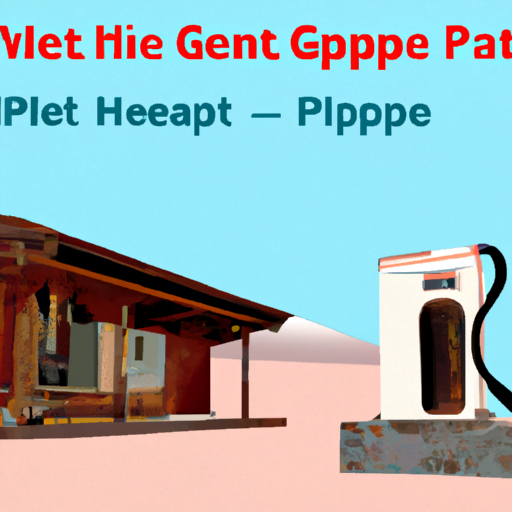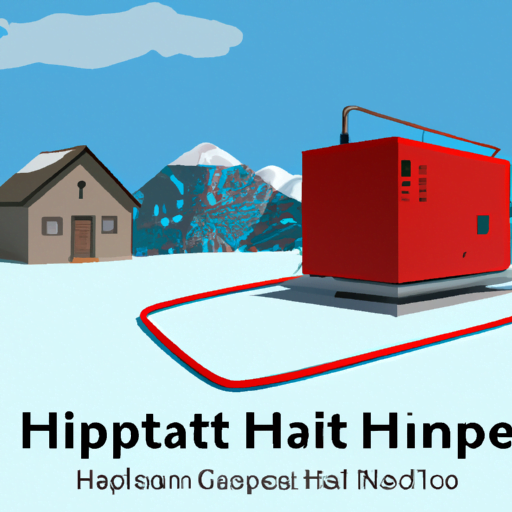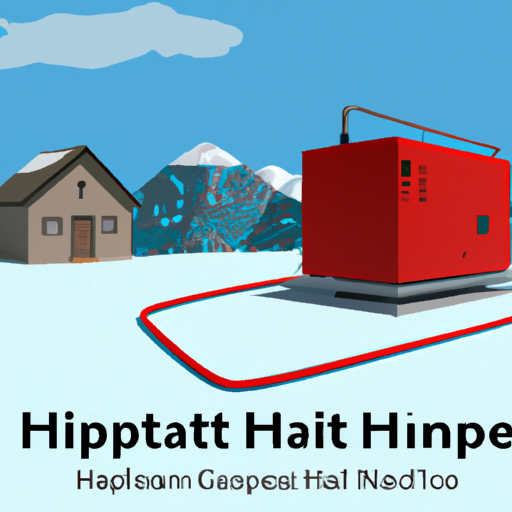So, let’s talk about off-grid living. Have you ever wondered if it’s possible to install a heat pump in remote off-grid locations? You know, those places where you don’t have access to the traditional electricity grid. Well, you might be surprised to learn that it is indeed possible to have a heat pump in these off-grid areas.
Now, you might be thinking, how is that even possible? Don’t heat pumps require electricity to operate? Well, yes, that’s true. Heat pumps do require power, but there are alternative solutions for generating electricity in off-grid locations. From solar panels to wind turbines, there are various renewable energy sources that can be used to power a heat pump.
In fact, heat pumps can actually be more efficient in off-grid situations because they can utilize the renewable energy available in abundance. With the right setup and equipment, you can not only have a heat pump for heating and cooling, but you can also have a sustainable and eco-friendly energy solution for your off-grid living.
In our upcoming article, we’ll explore the different options and technologies available for installing a heat pump in remote off-grid locations. We’ll dive deeper into the details and discuss the pros and cons of each solution, so you can make an informed decision if you’re considering going off-grid and want to have a reliable heating and cooling system. Stay tuned!

The Basics of Off-Grid Living
Understanding Off-Grid Living
Living off-grid refers to a lifestyle where individuals or communities are self-sufficient and do not rely on public utilities such as electricity, water, or gas. It is a way of life that embraces sustainability and independence by generating its own power and resources. Off-grid living can be found in remote locations where grid connections are not available or in intentional communities that choose to disconnect from the public services.
Benefits of Off-Grid Living
There are numerous benefits to living off-grid, including reduced dependency on external resources, lower utility bills, and increased self-sufficiency. By generating their own power, off-grid dwellers are not subject to power outages or fluctuations in utility costs. Furthermore, off-grid living promotes environmental consciousness by reducing carbon emissions and dependence on fossil fuels.
Challenges of Off-Grid Living
Living off-grid also presents its fair share of challenges. One of the main obstacles is the lack of access to essential utilities, which must be sourced independently. Additionally, off-grid living often requires more effort and dedication to maintain and manage the necessary systems. However, with careful planning and the right equipment, these hurdles can be overcome.
Introduction to Heat Pumps
What is a Heat Pump?
A heat pump is a heating and cooling system that is able to provide both warm and cold air to a living space. Unlike traditional heating methods that generate heat, heat pumps extract heat from the air, ground, or water and transfer it to your home. In essence, a heat pump works by taking advantage of the natural heat sources present in the environment, making it a highly energy-efficient option.
How Do Heat Pumps Work?
Heat pumps work on the principle of refrigeration, utilizing a heat exchanger to extract heat from a source and transfer it to another location. In heating mode, the heat pump absorbs heat from the outside environment and releases it inside the building. Conversely, in cooling mode, the heat pump absorbs heat from inside the building and releases it outside. This process is achieved through the use of a refrigerant that changes state from a gas to a liquid, allowing the transfer of heat.
Advantages of Heat Pumps
Heat pumps offer several advantages that make them an attractive option for off-grid living. Firstly, they are highly efficient, producing more energy than they consume. By harnessing heat from the environment, heat pumps can achieve high levels of energy efficiency, reducing energy costs in the long run. Additionally, heat pumps do not rely on the burning of fossil fuels, making them a greener alternative and contributing to a lower carbon footprint.
Considerations for Remote Off-Grid Locations
Access to Electricity
One of the main challenges of off-grid living is the lack of access to electricity. Remote locations may not have access to a nearby power grid, requiring alternative solutions for power generation. Those looking to install a heat pump off-grid need to carefully consider how they will generate enough electricity to meet their needs.
Size and Power Requirements
Heat pumps come in different sizes and power requirements, and it is essential to choose one that matches the energy demands of the property. In off-grid locations, where power may be limited, it is crucial to assess the available power supply and ensure that the heat pump’s requirements can be met.
Environmental Factors
Off-grid locations often experience harsh weather conditions, such as extreme cold or high humidity. When considering the installation of a heat pump, it is vital to choose a model suitable for the prevailing environmental factors. Some heat pumps are specifically designed to withstand colder climates, while others are more effective in hot and humid regions.

Power Generation Options for Off-Grid Heat Pump Systems
Solar Power
Solar power is a popular choice for off-grid power generation. By harnessing the energy from the sun, solar panels can convert sunlight into electricity. This renewable energy source is clean and abundant, making it an attractive option for off-grid living.
Wind Power
Wind power is another viable option for generating electricity in remote locations. Wind turbines are used to harness the kinetic energy of the wind and convert it into electrical power. Like solar power, wind power is a clean and renewable energy source, providing a sustainable solution for off-grid living.
Hydro Power
For properties near bodies of water, hydro power can be an excellent option. Water turbines are used to convert the energy of flowing or falling water into electricity. Micro-hydro systems can be effective in generating power for heat pumps in off-grid locations, utilizing the natural flow of rivers or streams.
Choosing the Right Heat Pump for Remote Off-Grid Locations
Sizing and Capacity
When selecting a heat pump for off-grid living, it is crucial to consider the sizing and capacity of the unit. A heat pump that is too small may not adequately heat or cool the living space, while a unit that is too large may consume excessive amounts of power. Proper sizing and capacity calculations ensure that the heat pump is efficient and meets the energy requirements of the property.
Low-Energy Models
Opting for low-energy models can significantly contribute to reducing the power demands of the heat pump system. Some heat pumps are specifically designed to be highly efficient, consuming minimal energy while maintaining optimal performance. Investing in these energy-saving models can enhance the overall sustainability of the off-grid living system.
Backup Heating Options
In remote off-grid locations, it is essential to have a backup heating option in case of power outages or system malfunctions. Stand-alone heating systems such as wood-burning stoves or propane heaters can provide a reliable source of heat when the heat pump is not operational. Having a backup heating option ensures that your living space remains comfortable even during unforeseen circumstances.
Installation Challenges in Remote Locations
Transportation of Equipment
Installing a heat pump in a remote off-grid location can pose logistical challenges, particularly when it comes to transporting the equipment. The remote nature of the location may require specialized transportation methods, such as helicopters or off-road vehicles, to bring the necessary components to the site.
Site Preparation
Preparing the installation site is another crucial step in installing a heat pump in remote off-grid locations. The ground must be properly leveled and cleared to ensure stable placement of the unit. Furthermore, any necessary civil works, such as digging trenches for piping or installing a ground loop system, must be carefully executed.
Installation Requirements
The installation of a heat pump requires technical expertise and knowledge of the system’s components. It is essential to engage professionals with experience in off-grid installations to ensure a safe and efficient installation. Adequate ventilation and proper insulation are also essential to maximize the heat pump’s performance and energy efficiency.
Maintenance and Service Considerations
Scheduled Inspections and Cleanings
Regular maintenance is crucial to keep the heat pump system operating at its optimal efficiency. This includes scheduled inspections and cleanings of the unit, ensuring that all components are in good working condition. Filters should be cleaned or replaced, refrigerant levels checked, and electrical connections examined for any signs of wear or damage.
Addressing Repairs and Malfunctions
In the event of a malfunction or breakdown, it is vital to promptly address the issue to minimize downtime and ensure the functioning of the heat pump system. Off-grid locations may present challenges in terms of accessing repair services, so it is essential to have a contingency plan in place or be equipped with the necessary skills and knowledge to troubleshoot common problems.
Availability of Service Technicians
Living in a remote off-grid location can make it challenging to find service technicians who are familiar with heat pump systems. It is recommended to establish a network of reliable service providers beforehand or to invest in training and resources to handle routine maintenance or minor repairs independently.
Costs and Financing Options
Initial Investment
The installation of a heat pump system in a remote off-grid location typically involves a significant initial investment. This includes the cost of the heat pump unit, installation fees, and the necessary power generation equipment. However, it is important to consider the long-term benefits and cost savings that can be achieved through reduced utility bills and increased energy efficiency.
Operating Costs
While off-grid living presents opportunities for cost savings, it is important to note that there will still be ongoing operating costs associated with running a heat pump system. These costs include the maintenance and servicing of the system, as well as the fuel or power required to generate electricity. It is crucial to budget for these expenses to ensure the sustainability of the off-grid living arrangement.
Financing and Government Incentives
Financing options may be available to assist with the initial investment of a heat pump system in remote off-grid locations. Additionally, some governments and local authorities offer incentives or grants to promote the use of renewable energy sources and energy-efficient technologies. It is worth exploring these options to help offset the costs of installation and operation.
Environmental Impact of Off-Grid Heat Pump Systems
Reduced Carbon Emissions
By utilizing the heat from the environment, heat pumps significantly reduce the carbon emissions typically associated with traditional heating methods. Off-grid heat pump systems rely on renewable energy sources, such as solar power or wind power, which further contribute to a lower carbon footprint. Embracing off-grid living with a heat pump system can have a positive impact on the environment by reducing greenhouse gas emissions.
Energy Efficiency
Heat pumps are renowned for their high energy efficiency. By extracting heat from renewable sources, heat pumps can achieve a high coefficient of performance (COP). This means that for every unit of electricity consumed by the heat pump, multiple units of heat energy are produced. This increased efficiency leads to lower energy demand and reduced operating costs.
Sustainable Heating
Heat pumps provide a sustainable heating solution for off-grid living. By utilizing renewable energy sources, heat pumps minimize reliance on non-renewable resources, reducing the strain on the environment. Off-grid heat pump systems contribute to a more sustainable and environmentally friendly way of life, aligning with the principles of off-grid living.
Conclusion
Is it possible to install a heat pump in remote off-grid locations? The answer is a resounding yes. With careful planning, consideration of power generation options, and choosing the right heat pump for the specific requirements of the location, off-grid living with a heat pump system is feasible. By embracing off-grid living and utilizing renewable energy sources, individuals and communities can enjoy the benefits of a sustainable and self-sufficient lifestyle. While challenges may arise, such as transportation logistics and limited access to maintenance services, the rewards of reduced utility costs, lower carbon emissions, and increased energy efficiency make the installation of a heat pump in remote off-grid locations a worthwhile endeavor. So go ahead, explore the possibilities and take the leap towards off-grid living with a heat pump system. You’ll be making a positive impact on the environment while enjoying the comfort and convenience of a sustainable heating solution.




